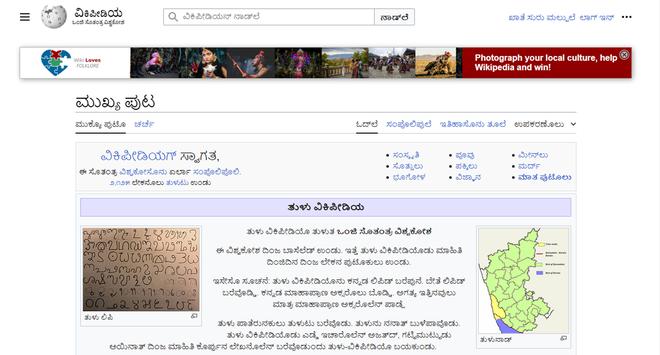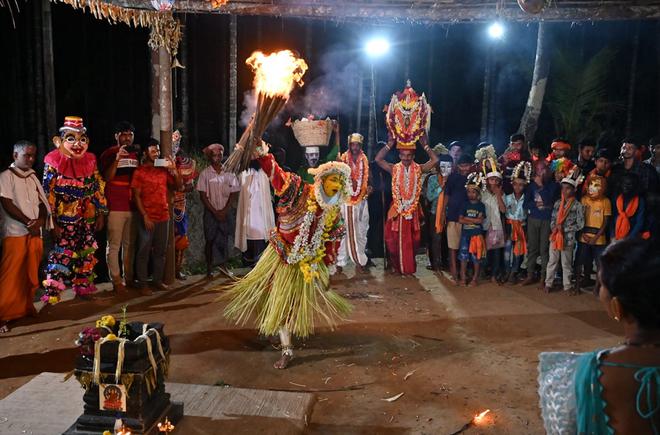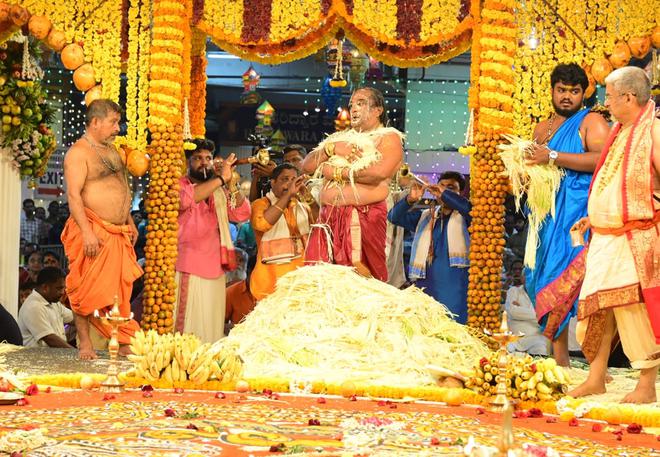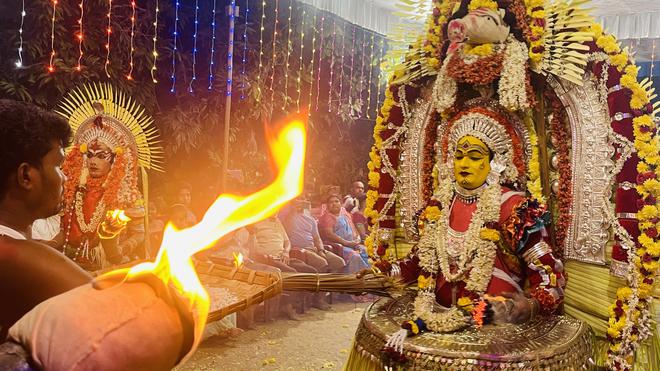About seven years after Tulu Wikipedia went live, it has more than doubled in size and has over 2,100 articles now. It had a little over 1,000 articles when it went live on August 6, 2016, at the Wikiconference India, 2016, at Chandigarh, in which Katherine Maher, Executive Director, Wikmedia Foundation, U.S., had announced the new project.

Tulu Wikipedia, which can be accessed at http://tcy.wikipedia.org, was in incubation for about eight years since 2008 before it went live. It was the 23rd Indian language Wikipedia to achieve this distinction. Presently Tulu Wikipedia has 11,434 pages with 7,61,224 words.
A non-scheduled language, Tulu is spoken commonly and prominently in Dakshina Kannada district and southern parts of Udupi district in Karnataka and northern parts of Kasaragod district in Kerala. Tulu speakers are spread all over India and abroad.
Wikipedia is now available in 24 Indian languages with Santali being the 24th to go live, said U.B. Pavanaja, who is also the founder and editor of www.vishvakannada.com, which is the first on-line Kannada magazine. Kannada Wikipedia, which went live on June 12, 2003, has more than 31,500 articles, Pavanaja said.

Mentors of Tulu Wikipedia
Tulu speaking professionals from Dakshina Kannada – Pavanaja, an IT professional, Vishwanath Badikana and Kishore Kumar Rai Sheni, both senior college teachers, Bharatesh Alasandemajalu, a bank employee, and Benett G. Ammanna, a former member of Karnataka Tulu Sahitya Academy -- are among the prominent people behind the birth of Tulu Wikipedia. This group continues to keep the pages alive.
The mentors launched Karavali Wikimedians User Group, a registered body exclusively for writing for Tulu Wikipedia.
“It is the only such user group in Karnataka now devoted for writing for a language Wikipedia,” said Badikana, the president of the user group who teaches Kannada at St. Aloysius College in Mangaluru. Writers use Kannada script for writing in Tulu.

Criteria for a good article
Pavanaja, the brain behind the launch of Tulu Wikipedia, said that as per the criteria for a good article prescribed by Wikipedia, it should have at least 2,000 bytes or 500 words to 600 words providing comprehensive information. For example, an article on a personality should have details regarding his or her birth, childhood and education, achievements, awards if any won and the like.
Pavanaja, the admin of both Tulu and Kannada Wikipedia, said that if the Wikipedia page is to be active, between five and 10 articles would have to be uploaded and at least 15 editors will have to edit it on a monthly basis.
“The article should also provide “inter-wiki link” to the reference material. It should go with an image of the personality. The article should be listed in prescribed categories, for example like Indian language or Indian culture,” added Badikana.
A series of workshops and editathons conducted by the User Group in Mangaluru and Udupi helped in the growth of Tulu Wikipedia, Pavanaja, who is also the secretary of the user group, said. Badikana added, “Of 6,089 registered users (writers) 60 are active.” Contributions are completely voluntary.

Advantage of writing in local languages
Referring to writing for vernacular language Wikipedia, including Tulu, Badikana said that some writers who wrote both in English and in vernacular languages translated the prominent articles of vernacular languages to English Wikipedia from where it gets translated to other foreign languages and vernacular languages. “Thus the contents of one language, relating to culture, practices or any other matter, travel to many other languages,” he said.
“Recently a Tulu article of mine related to Karnataka coastal belt’s Siri Aradhane (Siri cult of worship) went to English from where it travelled to the German language,” Badikana pointed out. He has written 113 articles for both Tulu and Kannada Wikipedia from December 1, 2023 alone in addition to a number of articles written earlier.

Lacks institutional support
Edithons and workshops on writing for Tulu Wikipedia organised by the user group lack any institutional support, including from Mangalore University which has a Tulu Peetha (Tulu Study Chair) and other private and deemed to be universities in the coastal belt. “The educational institutions should groom the new writers by organising training sessions,” said Pavanaja.
In addition, not many Tulu researchers, writers and artistes have bothered to write in Tulu for Wikipedia. Organising theme based edithons, like woman and folklore, by institutions will help to increase the number of articles, Pavanaja said.
He said that IT companies and other institutions can provide laptops or desktops to Tulu speaking college students to provide them access to write for Tulu Wikipedia.
Badikana said that the government and deemed to be universities should identify writing for Tulu Wikipedia as an academic work while counting articles under annual performance index (API). If that is done, more college teachers will come forward to write.
Absence of an unicode for Tulu is another drawback in increasing articles on Tulu Wikipedia, he said.
Not yet in Eighth Schedule
“An active Tulu Wikipedia will help bring pressure on the government to include Tulu in the Eighth Schedule of Indian Constitution,” Pavanaja argued.
If Tulu is included in the Eighth Schedule, it would get recognition from the Sahitya Akademi. Then, it could get Tulu books translated into other recognised Indian languages. Elected members can ask questions in Tulu in Parliament and State Legislature. Candidates could eventually even write All-India competitive examinations in Tulu, he said.

Union government’s reply
The Union government told the Rajya Sabha in March, 2023, that there are no fixed criteria for consideration of any language for inclusion in the Eighth Schedule. The attempt to fix such criteria through the Sitakant Mohapatra Committee has been inconclusive, Union Minister of State for Home Affairs Nityanand Rai said, while replying to a question by member D. Veerendra Heggade.
In December, 2021, the Union government told the Lok Sabha that there is no move to include Tulu in the Eighth Schedule. “It is neither practical nor administratively feasible, at present, to increase the number of official languages,” Rai said while replying to an un-starred question by member from Kasaragod (Kerala) Rajmohan Unnithan.
Demand to declare as second State language
The Karnataka government has said that following the demand for declaring Tulu as the second State language, it has asked Bihar, Andhra Pradesh, and West Bengal governments to furnish information on the steps taken by them to adopt their second State language.
Replying to an unstarred question by B.M. Farooq in the Karnataka Legislative Council in February, 2024, Karnataka Minister for Kannada and Culture Shivaraj S. Tangadagi said information from three States had been sought on the opinion by the State’s Legal Department.
The Minister said the State government on January 12, 2023, issued an order constituting a committee headed by M. Mohan Alva, chairman, Alva’s Education Foundation, Moodbidri, to study and submit it a report on declaring Tulu as the second State language. The committee submitted its report after studying the structure of Tulu, its history, literary tradition, modern and ancient Tulu literature, Tulu inscriptions, and Tulu script and culture. Later, the government sought the opinion of the Legal Department on the report. The Legal Department opined that if any State was to declare a language as the second State language, it should obtain a report from a legally constituted committee and it should study the steps taken by other States in this regard.







